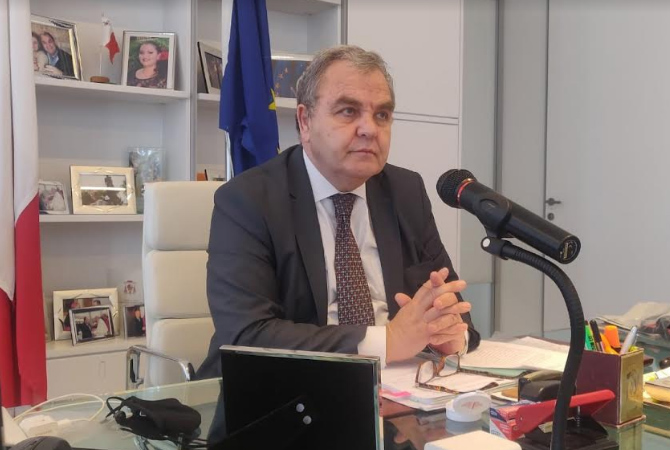Speaker of the House of Representatives Anġlu Farrugia participated in the Conference of EU Speakers held online and hosted by the German Parliament, as the last event of the inter-parliamentary dimension of the German Presidency of the Council of the European Union.
The main theme of the conference dealt with the risks and opportunities for representative democracy in the context of digitalisation and the changing public sphere. The session was moderated by journalist Anke Plättner, while Prof. Jeannette Hofmann and Dr Francesca Bria, experts in the field, addressed the participants. Prof. Hofmann, who is currently researching the relationship of digitalisation and democracy, the social shaping of digital technologies and the regulation of digital platforms, stated that digital technologies can be positive or negative depending on how they are used. She remarked that regulation in this field is therefore crucial and institutions should not look at digital platforms as a threat but as tools, which can better serve the public interest. Dr Francesca Bria, an innovation economist and digital policy expert, also remarked on the importance of rules in the sector of digitalisation. She argued that if platforms are handled in the right way, they can give very positive results. She gave the example of the digital platform used by the Conference on the Future of Europe, which is based on a local open source project in Barcelona using Horizon 2020 EU funds. In the debate which followed the keynote speeches, the main thrust was that, if used properly, digital platforms give opportunities to make democracy more participative.

In his intervention, Speaker Farrugia outlined the importance of using digital tools, in particular during these unprecedented times. National parliaments have managed to exploit the tools available to them in order to continue their representative function throughout the pandemic. He pointed out, however, that the fast pace of the digital transformation that the world has undergone since the widespread accessibility of the internet has not been met with a comparable development in relevant legislation. The dangers of data leaks and manipulation impact on the users’ trust. Furthermore, the difficulty in distinguishing between fake and real news, especially when these appear alongside one another, has become one of the greatest threats to anyone trying to obtain genuine, unbiased information via social media platforms. The Speaker concluded that one cannot but acknowledge that a healthy democracy depends on citizens who are well-informed on important issues and public affairs. Democracy also depends on a diversity of viewpoints which have not been skewed to one side or another by some intermediary. The duty of parliaments is to see that the necessary safeguards are in place to ensure that citizens remain well-informed of the issues which impact them the most.
On the margins of the conference, Speaker Farrugia had a bilateral meeting with the newly appointed Speaker of the Parliament of Montenegro Aleksa Bečić. During the meeting, both sides recalled the excellent relations which exist between Malta and Montenegro. Mr Bečić thanked Malta for its support in its efforts towards EU accession, and stated that the Montenegrin Parliament will be stepping up its efforts in the areas identified by the relevant report on Montenegro. Speaker Farrugia noted that, as a small country, Malta would be able to share its experiences relating to EU accession and the reforms which have been implemented since then. Both sides agreed that bilateral relations between the two parliaments could also help consolidate the ties between the two countries.
Photos: Parliament of Malta










